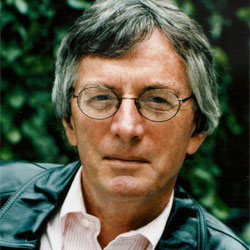At the start, it goes like this –
One’s childhood has a tremendous shape,
and moves like a wild animal
Through the deadfall and understory.
It’s endlessly beautiful,
elusive and on to something.
It hides out, but never disappears.
Later, the sacred places Delphi and Italy on us,
Flicking and flashing through the forest,
half-seen, half-remembered.
And with them the woods itself,
Each tree, each interlude of marsh grass and beaver shade
Something to tug the sleeve with.
In the end, of course, one’s a small dog
At night on the front porch,
barking into the darkness
At what he can’t see, but smells, somehow, and is suspicious of.
Barking, poor thing, and barking,
With no one at home to call him in,
with no one to turn the light on.
Notes on the Poem
How waggish is Charles Wright's approach to the subject suggested by the title "Pilgrim's Progress"? And how waggish is our use of the term "waggish", once you've read to the end of the poem? In the 1600s, English writer and minister John Bunyan composed and published "The Pilgrim's Progress from This World to That Which Is to Come; Delivered under the Similitude of a Dream." The lengthy prose piece was intended as a Christian allegory, depicting a devout everyman's journey through life and its travails and temptations, in search of ultimate salvation. Since its publication, the sweep and import of "The Pilgrim's Progress" has informed and inspired many adaptations and appeared as an influence in music, literature, film, theatre and more. An interesting omission in Wright's title is "The". To start, you get the impression that this is just *a* pilgrim's progress - something modest, average, not heightened and allegorical - really, anyone's progress. From there, Wright takes you on a journey that beautifully, simply balances the seemingly commonplace with the grand, starting with the matter-of-fact: "At the start, it goes like this - " and rolling gracefully into the unfurling of a life, made subtly more expansive and full of potential by the generous stretches of indented space. Not everyone does make it to the "the sacred places Delphi and Italy", but most pilgrims do encounter their equivalents of trees, marsh grass and the like. Everyone gets their sleeve tugged by something, has their moments of discovery and epiphany. The waggishness, then? In the end, Wright doesn't exactly leave us at the pearly gates, does he? He suggests that most of us pilgrims will "progress" to a place that is or feels very lonesome, like a small dog in the dark and ignored on the front porch. (In fact, this "poor thing" is not wagging his tail.) It's a wry and self-effacing way to end it all, but in the the midst of the humour, it leaves us reflecting with some measure of poignancy about where our progress will indeed take us.

With the lines “With no one at home to call him in,/ with no one to turn the light on” … could Wright also be suggesting that no matter how nobly we live our lives, there will be no one to reward us and welcome us in at the end of it all?